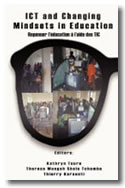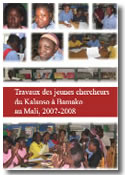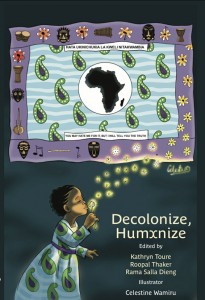Decolonize, Humxnize February 27, 2024
Whose knowledge counts? Why delve deep to understand self, history and intercontinental relations? How do people and communities heal from the wounds of colonization and related trauma passed from generation to generation? Such intractable questions are explored in this collection of essays on decolonization. To decolonize means to humxnize, which is of even greater urgency in the 21st century with colonization showing itself in new forms. Perspectives from several continents suggest pathways toward more convivial and equitable relations in society, and each chapter is presented in conversation with an illustration. The book will inspire young leaders, educators, activists, policymakers, researchers, and anyone resisting colonization and its effects and working for a kinder, gentler world.
published by Langaa Research and Publishing out of Cameroon and distributed via African Books Collective
- Is also available via other distributors, for example: www.amazon.com/dp/9956553581
- See here for the Table of Contents: www.langaa-rpcig.net/decolonize-humxnize
- Is promoted on social media:
See below the Praise for the Book:
Praise for the Book
These 13 instructive and sometimes personal chapters speak to the urgency of decolonization, building on the culture of ubuntu or recognizing oneself in others.
– François-Joseph Azoh, Psychologist, Lecturer at Ecole Normale Supérieure of Abidjan, Cote d’Ivoire
This book Decolonise Humxnize is an important addition to the Decolonial and Feminist Studies literature. The strength of this book is the focus on the everyday and the marginalised, thus reclaiming humxnity and centring often ignored experiences within a decolonial praxis. The book highlights efforts by activists, feminists, academics, and healers in addressing colonial trauma and colonial ecologies and decolonising knowledge, education, food systems, governance, and international development aid structures using ethics from the global south to reimagine and cocreate a decolonised humxnity.
– Dr. Njoki Wamai, Assistant Professor, United States International University (USIU) – Africa, Nairobi, Kenya
To colonize is to genocide. It is the cultural theft of one’s heritage and creates a caste system. Embrace this read and learn how we humXns are the X-factor in the liberation from mental and physical bondage fabricated by artificial and destructive methods. Read and discover how to enhance your ethnicity and preserve your legacy.
– Larry Lester, activist and president of the Greater Kansas City Black History Study Group, a branch of the Association for the Study of African American Life and History (ASALH), established in 1915 by Carter G. Woodson
Decolonize, Humxnize shares powerful stories of struggles to deconstruct and disassemble colonized and colonizing perspectives. A common thread throughout: the arduous and sustained work required to establish more equitable relationships and shift patriarchal paradigms. These stories resonate in very humxn ways and are a part of addressing gross power imbalances and reconciling people and peoples.
– Kim Horan, Health Promotion Manager, Department of Health, New Mexico State Government, US
Decolonize, Humxnize beautifully and incisively delves into the imperatives of decolonization, offering profound perspectives on reshaping humxn interactions toward equality. Through Global South lenses, the writers illuminate the complexities of power structures, challenge prevailing narratives, and invite the reader to embrace more inclusive values and reflective practices, rooted in understandings of histories and interdependencies.
– Abby Malan, Leadership Coach, Victoria, Canada (traditional territories of the Lekwungen peoples of the Songhees Nation) and Cape Town, South Africa (traditional territories of the Khoe-Sān people)
Decolonize, Humxnize lays bare the dehumanizing effects of centuries of colonization and explores calls for change. The term “decolonize” is considered by some as a buzzword, but in this captivating book, 16 authors from different continents theoretically and practically engage the reader in 13 chapters, which the introduction aptly summarizes: “The ongoing journey of decolonization should embrace and encompass humxnizing processes of connecting with self and others, relearning history, undoing oppressive hierarchies and systems of exploitation, and conversing and cocreating across multiple boundaries in convivial ways.”
Connections between colonization, racism, and other “isms” are addressed, as are rehumxnizing intercontinental movements such as Black Lives Matter, #MeToo, and #RhodesMustFall. The experiences and research related emphasize knowledge of self, community, and the world. Knowledge of history is needed to “decolonize” and “humxnize.” Decolonization holds the “potential for reducing social exclusion and marginalization,” and learning about pathways for decolonization makes this book a worthy read.
– Dr. Wanja Njuguna, Senior Lecturer, Journalism and Media Technology, Namibia University of Science and Technology
Academic and research landscapes call for decolonization. The colonization of lands and knowledge systems, and systems of white supremacy succeeded because of the colonization of the mind. Humans are controlled by their minds. Western ways of thinking, believing, acting, and even valuing still dominate Africans’ perceptions of education, research, and policy, as well as economic activity (Beninese philosopher Paulin J. Hountondji, 1942-2024). Dismantling Eurocentric authority and power should start with the decolonization of the mind.
The book titled Decolonize, Humxnize is transformative in nature and will inform relevant education, policy research, leadership, and governance. It appropriately situates the crimes of colonization that perpetuate, inequality, exclusion, domination, oppression, and violence and that grossly violate human rights, especially gender. Each author’s contribution touches on very salient concerns in today’s challenging world, addressing issues with clarity and no misconceptions.
A statement from the introduction of the book summarizes its main thrust. If we do not decolonize, we leave ourselves and others “locked up” to live within confines dictated by extractive and exploitative systems that respect neither people nor planet. There is a reawakening of thinking and writing on decolonization, which requires a much broader understanding of the world starting from the psychology of the liberation of the mind from colonial enslavement. When this eventually succeeds, there will be a progressive transformation of the world in ways not foreseen by the West. This book contributes toward decolonial action and will benefit students, teachers, policymakers, and all those involved in organizations helping to bridge the gap between families and communities and the state.
– Therese Mungah Shalo Tchombe, Emeritus Professor/Honorary Dean of Education, University of Buea, Cameroon
My generation, in the early 1960s, was preoccupied with Negritude and Neo-colonialism, following the intellectual lead of such great names as Leopold Sedar Senghor and Kwame Nkrumah. This book (a collection of insightful essays by new-generation bright minds) has carried the interrogative dialogue a step further by focusing on DE-COLONISATION, in its multiple dimensions. It is like saying:
Even as we struggle with historical wounds, let us construct a more progress-oriented future for ourselves.
Questioning widely-held assumptions, bringing Gender Equality to the front burner, and addressing its core message to the minds of the sidelined citizen, the book goes beyond making a point to inviting the reader to a serious, in-depth and critical appraisal of the mission of de-colonising the mind (to borrow Ngũgĩ wa Thiong’o’s enticing message) in a practical and sustained manner, so that the erstwhile marginalised and oppressed would progressively evolve into being an accepted and respected world citizen – no longer pushed aside, but fully integrated and widely accepted.
This substantive message of the book is intended for internalisation, and not for mere memorisation. Its motives are idea-generation and thought-sharing. The attention that it draws on the need to HUMXNISE (in place of HUMANISE) is a clarion call to all of us. Its discourse mode goes beyond merely recanting the harm that colonisation has done to throwing open avenues for the exploration of viable ways of re-inventing and re-generating ourselves.
Here then is a book for every one of us: a MUST-READ, a MUST-DIGEST, a MUST REGULARLY CONSULT, and, above all, a MUST-SHARE.
– Emeritus Professor Pai Obanya, University of Ibadan-Nigeria



